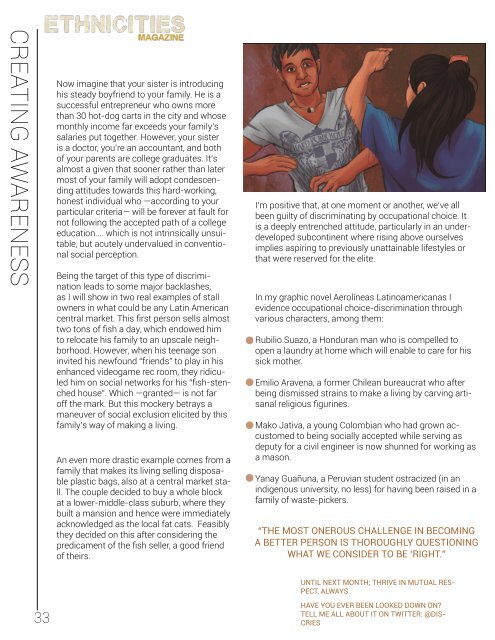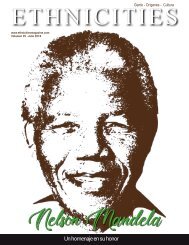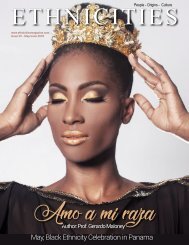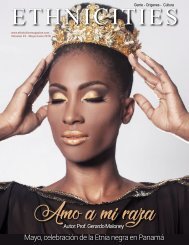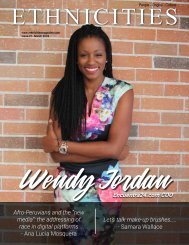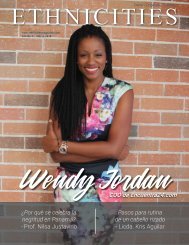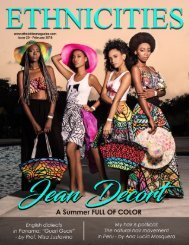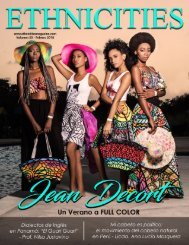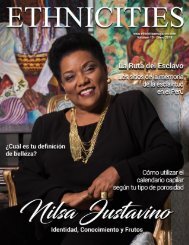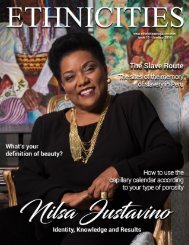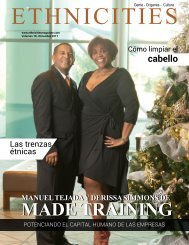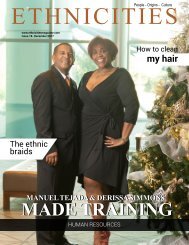Volume 6 - December Ethnicities Magazine
December finally arrived, and this month brings for you the last issue of Ethnicities Magazine for this great year 2016. Please enjoy all the interesting topics we have in this issue for you about health, intersting and inspiring stories, about our afropanamanian gastronomoy and more. I invite you to read it from page one till the end, I guarantee you that everything your read will benefit you and all those around you. I want to specially thank our writers that every month send us interesting topics to share with Ethnicities Magazine readership. Please enjoy it and share with your family and friends. HAPPY HOLIDAYS.
December finally arrived, and this month brings for you the last issue of Ethnicities Magazine for this great year 2016. Please enjoy all the interesting topics we have in this issue for you about health, intersting and inspiring stories, about our afropanamanian gastronomoy and more.
I invite you to read it from page one till the end, I guarantee you that everything your read will benefit you and all those around you.
I want to specially thank our writers that every month send us interesting topics to share with Ethnicities Magazine readership.
Please enjoy it and share with your family and friends.
HAPPY HOLIDAYS.
Create successful ePaper yourself
Turn your PDF publications into a flip-book with our unique Google optimized e-Paper software.
CREATING AWARENESS<br />
Now imagine that your sister is introducing<br />
his steady boyfriend to your family. He is a<br />
successful entrepreneur who owns more<br />
than 30 hot-dog carts in the city and whose<br />
monthly income far exceeds your family’s<br />
salaries put together. However, your sister<br />
is a doctor, you’re an accountant, and both<br />
of your parents are college graduates. It’s<br />
almost a given that sooner rather than later<br />
most of your family will adopt condescending<br />
attitudes towards this hard-working,<br />
honest individual who —according to your<br />
particular criteria— will be forever at fault for<br />
not following the accepted path of a college<br />
education.... which is not intrinsically unsuitable,<br />
but acutely undervalued in conventional<br />
social perception.<br />
Being the target of this type of discrimination<br />
leads to some major backlashes,<br />
as I will show in two real examples of stall<br />
owners in what could be any Latin American<br />
central market. This first person sells almost<br />
two tons of fish a day, which endowed him<br />
to relocate his family to an upscale neighborhood.<br />
However, when his teenage son<br />
invited his newfound “friends” to play in his<br />
enhanced videogame rec room, they ridiculed<br />
him on social networks for his “fish-stenched<br />
house”. Which —granted— is not far<br />
off the mark. But this mockery betrays a<br />
maneuver of social exclusion elicited by this<br />
family’s way of making a living.<br />
An even more drastic example comes from a<br />
family that makes its living selling disposable<br />
plastic bags, also at a central market stall.<br />
The couple decided to buy a whole block<br />
at a lower-middle-class suburb, where they<br />
built a mansion and hence were immediately<br />
acknowledged as the local fat cats. Feasibly<br />
they decided on this after considering the<br />
predicament of the fish seller, a good friend<br />
of theirs.<br />
I’m positive that, at one moment or another, we’ve all<br />
been guilty of discriminating by occupational choice. It<br />
is a deeply entrenched attitude, particularly in an underdeveloped<br />
subcontinent where rising above ourselves<br />
implies aspiring to previously unattainable lifestyles or<br />
that were reserved for the elite.<br />
In my graphic novel Aerolíneas Latinoamericanas I<br />
evidence occupational choice-discrimination through<br />
various characters, among them:<br />
Rubilio Suazo, a Honduran man who is compelled to<br />
open a laundry at home which will enable to care for his<br />
sick mother.<br />
Emilio Aravena, a former Chilean bureaucrat who after<br />
being dismissed strains to make a living by carving artisanal<br />
religious figurines.<br />
Mako Jativa, a young Colombian who had grown accustomed<br />
to being socially accepted while serving as<br />
deputy for a civil engineer is now shunned for working as<br />
a mason.<br />
Yanay Guañuna, a Peruvian student ostracized (in an<br />
indigenous university, no less) for having been raised in a<br />
family of waste-pickers.<br />
“THE MOST ONEROUS CHALLENGE IN BECOMING<br />
A BETTER PERSON IS THOROUGHLY QUESTIONING<br />
WHAT WE CONSIDER TO BE ‘RIGHT.”<br />
33<br />
UNTIL NEXT MONTH; THRIVE IN MUTUAL RES-<br />
PECT, ALWAYS .<br />
HAVE YOU EVER BEEN LOOKED DOWN ON?<br />
TELL ME ALL ABOUT IT ON TWITTER: @DIS-<br />
CRIES


